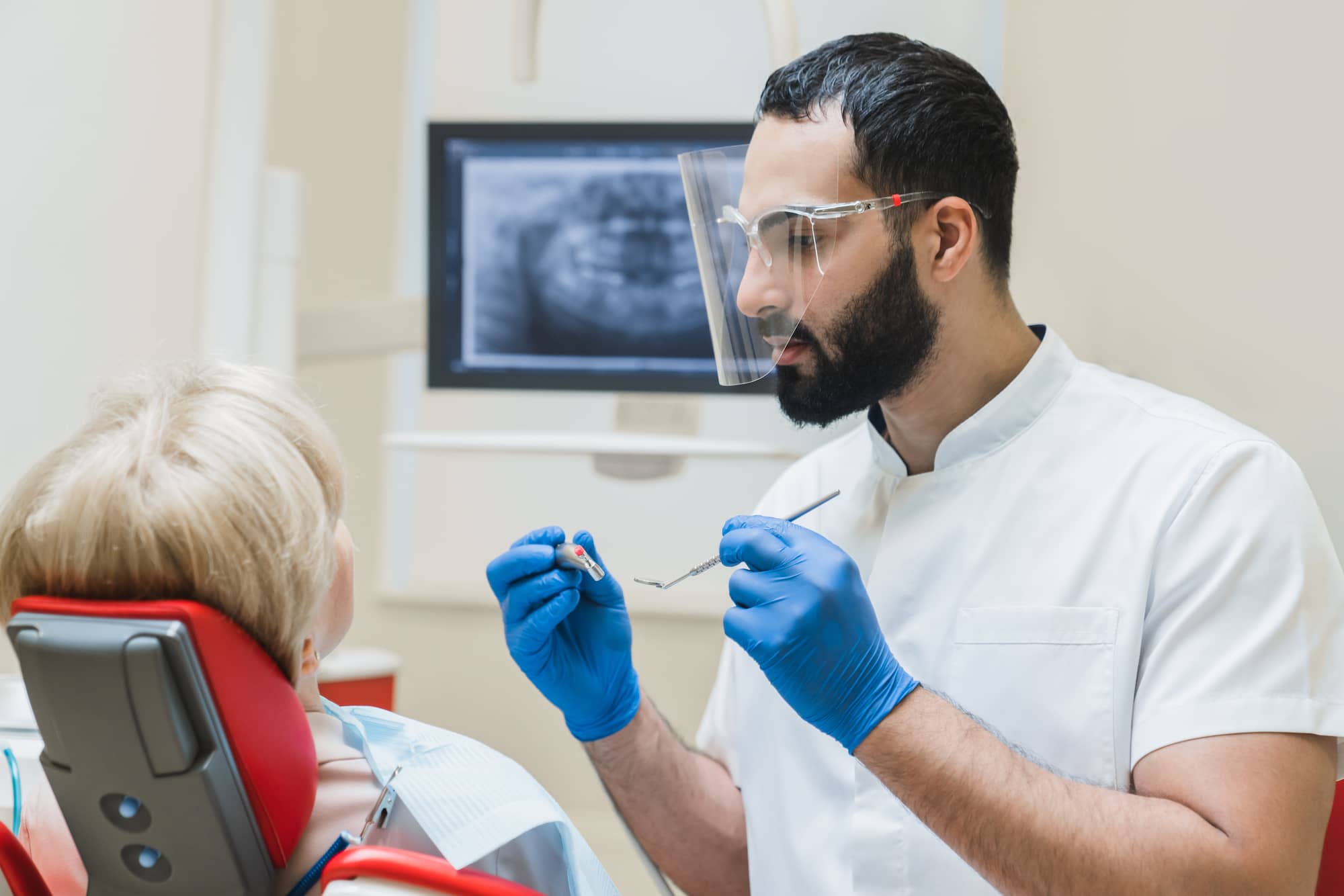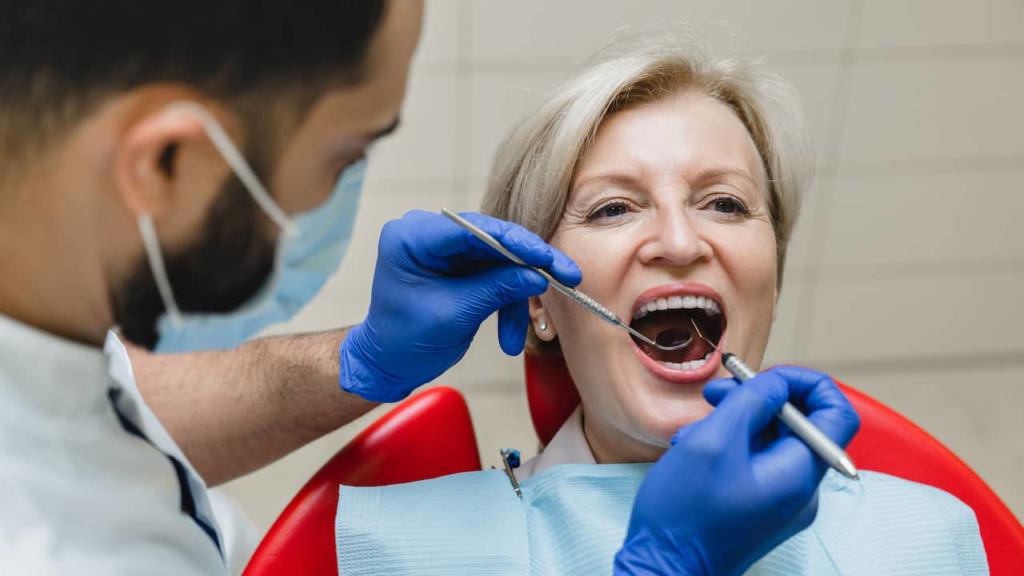
Can I Get Dentures If I Have Gum Disease? What to Know
By David Hudnall, DMD
Gum disease is a common, serious infection that is the primary cause of tooth loss for adults. Not only does it affect your oral health, but it is a leading indicator of the presence of other systemic diseases affecting the health of the body as a whole. Conditions such as cardiovascular disease and diabetes are common in patients who have gum disease.
Patients often want to know, “Can I get dentures if I have gum disease?” The answer, “yes,” may surprise you. And in certain cases, removing all of the teeth and getting dentures is the best dental care solution and the only method to stop the further advancement of gum disease. More on that later.
Gum disease prevention begins with recognition and taking action. There’s an old saying, “Only brush the teeth that you want to keep.” And it’s true. If you fail to practice adequate daily oral hygiene, your teeth will eventually fail you and you will lose them. We’re going to delve into gum disease, what it is, what some of the ramifications are if it is allowed to progress, and how dentures and gum disease are related.
What Is Gum Disease?
Gingivitis, a.k.a. gum inflammation, usually happens before having periodontitis, which is actual gum disease. Gingivitis is caused by the build-up of bacteria-filled plaque around the gumline of the teeth. Not all gingivitis leads to periodontitis as most people do experience gingivitis at some point during their lives. Its primary symptom is bleeding when brushing, making it easy to ignore. Although the gums may be irritated and bleed, the teeth are still firmly planted in their sockets. Because no irreversible bone or tissue damage has occurred at this stage, gingivitis is reversible with treatment.
Without intervention, gingivitis can progress into a full-blown periodontal disease, leading to the gum tissue and bone pulling away from the teeth. Small spaces form between the teeth and gums, allowing plaque and debris to collect below the gum line and become infected with bacteria that eat away at the support for the teeth. The body’s immune system then fights the infection as the plaque spreads more deeply beneath the gum line.
Gum disease may manifest in several ways:
- red, swollen, and tender gums that bleed easily
- a receding gum line
- pus and drainage that occurs around the teeth
- constant bad breath or a foul taste in the mouth
- teeth that have shifted or become loose
Remember, it’s never normal for your gums to bleed. If your gums bleed when you brush or floss, you have gingivitis or actual periodontal disease.
Believe it or not, it is possible to have periodontal disease and have no warning signs or symptoms at all. That’s why it’s important to not only practice good dental hygiene habits at home every day but also make sure that you visit your dentist at least twice a year for regular check-ups. The sooner that periodontal disease is detected, the better chance you have of stopping it and avoiding dentures altogether.

Can I Get Dentures If I Have Gum Disease?
Yes, you can. But the real question that you should be asking is, “Will I have enough bone to wear dentures?” And that is a very different question.
If you’ve been diagnosed with gum disease, there is a point that you must come to crossroads. The longer that periodontal disease is allowed to eat away at your gums and jawbone, the less bone present for dentures to rest upon, making dentures even more difficult to wear than what most people experience. If you have been fighting gum disease for most of your life, do you really believe that it will miraculously get better? Acting to remove the teeth and get dentures early is preferable to waiting until all of the teeth are hanging on by a thread and the majority of the bone has dissolved away.
Are Implant-Supported Dentures a Treatment Possibility?
Patients often want to know if implant-supported dentures are an option for them. After all, they have less bone to work with and may need help keeping their dentures secure. The more advanced a gum disease case becomes, the less likely that the patient will be able to have implants as a treatment alternative to stabilize their dentures. If you have suffered significant bone loss, you may need extensive bone grafting to increase the quantity of bone before implants can be placed.
Realistically speaking, you need healthy gums and bone in order to place implants. If you have suffered from advanced gum disease for a long time, understand that dental implants may also be lost to the gum disease that affects implants: peri-implantitis. Unless you are committed to stopping smoking, changing your daily dental hygiene regimen, and drastically improving your home hygiene, your implants will fail just like the teeth that they replaced.
Will Getting Dentures Stop Gum Disease?
Does gum disease go away after a tooth is removed? If a tooth is loose, the best step is to have it extracted. However, gum disease will not disappear once the tooth is removed. Left untreated, periodontitis can continue to spread to other teeth, causing the loss of more teeth.
Will getting dentures stop gum disease? Gum disease cannot exist without the presence of teeth or implants in the jawbone. The best treatment for chronic long-term uncontrolled periodontitis is extraction. In addition to arresting gum disease, removing all of the teeth in a patient with advanced gum disease and dentures will also eliminate low-grade infection and improve underlying systemic diseases, like diabetes.
Gum Care After Dentures
Just because you no longer have teeth doesn’t mean that you can ignore the health of your gum tissue. After all, you are depending on your gums to support your dentures and improve your ability to chew properly. Gums need two things for good health: stimulation and air. Removing your dentures while you sleep allows exposure to the natural moisture and air in the mouth that promotes healing. The tongue and your gums need to be cleansed and stimulated to improve blood flow every day with either a soft-bristled toothbrush or a washcloth. Doing this also has the added benefit of removing bacteria that causes bad breath.
How To Prevent Worsening Gum Disease
There are several ways to address periodontal problems and still save natural teeth. Three factors that affect your prognosis for gum disease include what you do at home, what a dental professional can do to help you, and your genetics. Of the three, you have the least control over genetics as some people are more prone to periodontal issues than others. Working in cooperation with a dentist allows you to take control of at least two of the three factors, improving your chances of stopping the disease process.
Therapy can be conducted to arrest the disease, selective extractions of affected teeth and partial dentures can restore your smile and your ability to eat, and proper daily care can keep the gum disease at bay making it possible to save your teeth for many more years to come.
Periodontal Therapy
If you have suffered gum problems that extend beyond gingivitis, it might be time to solicit the advice of a periodontist, a dental specialist that focuses on treating gum diseases. While the effects of gum disease cannot be reversed, periodontitis can be arrested with treatment allowing you to keep your teeth. There is no true substitute for being able to chew with your own natural teeth.
Much like any other chronic ailment, periodontal disease patients require ongoing maintenance to assure that their disease does not return or advance. Many people falsely believe that they are cured with a few treatments and they stop the maintenance visits. If you have gum disease, frequent check-ups play a big part in managing your disease. If you are not committed to them and the home care that accompanies them, your teeth will fail.
Properly Cleaning Your Dentures
If you have some teeth that were lost to periodontal disease or tooth decay and wear partial dentures, it is critical to take care of your remaining natural teeth. Your partial depends on them for support and stabilization. Previous bouts with gum disease can easily spread, affecting the remainder of the teeth. Not only is it important to remove your partial denture to floss and brush your teeth, but your partial must also be cleaned free of plaque and debris every day. Putting an unclean partial back into a clean mouth will allow germs to spread and affect the health of the teeth and gums.
Home Care
For gum disease to remain arrested, an excellent home care routine is required. Brush twice each day for at least two minutes, ideally after breakfast and before going to bed. Use an electric toothbrush with a small round brush head to gain better access to all surfaces. Clean between your teeth using interdental brushes and floss at least once daily. Refrain from smoking. Have your teeth professionally cleaned every six months, or every three to four months if you have gum disease.
Addressing Dentures and Gum Disease
Dentures are never the first choice as a treatment option. It is estimated that you lose 80% of your chewing force with dentures when compared to natural teeth. However, for many long-term sufferers of gum disease, dentures are the only realistic solution.
If you’ve seen a periodontist, tried all of the gum disease therapies and it hasn’t gotten better, it could be time to consider dentures. At European Denture Center our caring dental professionals will guide and help you make the best possible choice to address your specific situation. If your teeth are beyond saving, we have a number of denture options available to restore your smile and improve your appearance. See all that European Denture Center has to offer by browsing our denture offerings. Your next step to better dental health could be as close as a click or telephone call away!


